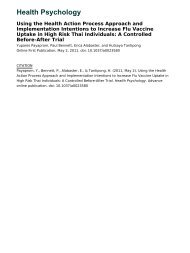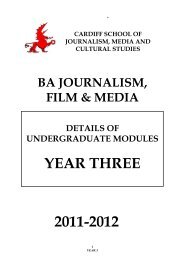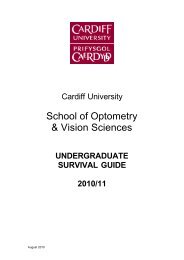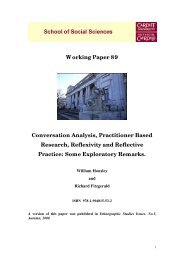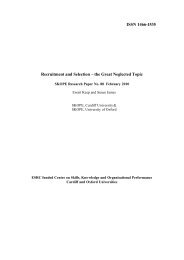Year 3 Catalogue 2011-2012 - Cardiff University
Year 3 Catalogue 2011-2012 - Cardiff University
Year 3 Catalogue 2011-2012 - Cardiff University
Create successful ePaper yourself
Turn your PDF publications into a flip-book with our unique Google optimized e-Paper software.
MODULE Diversity, Crime and Criminal CODE: SI0184 SEMESTER(S) Both<br />
TITLE: Justice<br />
MODULE Dr Matthew Williams CREDITS: 20 LEVEL: 3<br />
LEADER:<br />
CONTACT DETAILS Room 2.28 TEL: 029 20874853 E-MAIL: WilliamsM7@cf.ac.uk<br />
MODULE AIM(S)<br />
This module will provide a detailed overview of the study of<br />
crime and criminal justice by incorporating theoretical and<br />
policy issues relevant to gender, race, class and sexual<br />
orientation. The module is intended for students seeking to<br />
gain knowledge of criminology, policing, prosecution and the<br />
courts, and the sanctioning of offenders.<br />
On completion of the module a typical student will be able<br />
to:<br />
KNOWLEDGE AND COMPREHENSION<br />
• Show a sound knowledge of the theoretical explanations<br />
of and research evidence documenting different patterns<br />
of victimisation and offending according to race, class,<br />
gender and sexual orientation.<br />
• Describe contemporary developments in the criminal<br />
justice processing of diverse offenders, and evaluate<br />
contrasting views on such developments.<br />
• Demonstrate knowledge and understanding of the<br />
debates about the functions and powers of the police in a<br />
diverse society, and assess the historical and<br />
contemporary police response to various problems,<br />
victims and communities<br />
• Demonstrate knowledge and understanding of the<br />
differential treatment and experience of offenders serving<br />
community or custodial sentences..<br />
SKILLS (APPLICATION AND ANALYSIS)<br />
• Critically evaluate theoretical perspectives on issues<br />
related to diversity, equity, justice and the criminal justice<br />
system.<br />
• Articulate well-informed views on how race, class, gender<br />
and sexual orientation impact the processing of the<br />
criminal justice system.<br />
• Demonstrate the capacity to differentiate and critique<br />
different strategies of policing in a diverse society.<br />
• Present a clear and informed written argument in essays<br />
on historical and contemporary developments in the<br />
criminal justice processing of diverse offenders..<br />
UNDERSTANDING (SYNTHESIS AND EVALUATION)<br />
• Adopt a critical perspective on the ability of the criminal<br />
justice system to process offenders in an efficient and<br />
equitable way.<br />
• Evaluate the utility of various theoretical frameworks for<br />
explaining patterns of offending and victimisation along<br />
lines of race, class, gender and sexual orientation.<br />
• Synthesise different explanations of the processing of<br />
diverse offenders in contemporary society.<br />
• Critically evaluate criminological and criminal justice<br />
research related to diversity, equity and the criminal<br />
justice system.<br />
TRANSFERABLE SKILLS<br />
The module will contribute to the development of the following<br />
transferable skills:<br />
problem solving; communication; literacy and numeracy,<br />
critical thinking. Such skills will be evidenced via tutorial<br />
presentations and written work.<br />
SYNOPSIS OF MODULE CONTENT<br />
This module addresses the role and functioning of the police,<br />
courts and penal system in a contemporary society that is<br />
diverse in terms of race, class, gender, and sexual orientation.<br />
It reviews the major debates and issues surrounding patterns<br />
of victimisation and offending, including historical and<br />
contemporary perspectives. The module is designed to<br />
acquaint students with the types of crime control strategies<br />
currently adopted by government, and how these impact<br />
different problems, victims, and communities. The module will<br />
help students critically assess whether and how the criminal<br />
justice system operates in a fashion that is equitable to all<br />
members of society.<br />
METHODS OF LEARNING AND TEACHING<br />
Weekly lecture supported by four tutorials per semester.<br />
Students will be expected to make short presentations during<br />
tutorial sessions. Independent/guided study time will focus on<br />
preparing for tutorials, presentations, and exams. Students<br />
will be encouraged to use criminal justice web sites.<br />
OPPORTUNITIES FOR FORMATIVE ASSESSMENT<br />
Students will be required to make short presentations during<br />
the tutorials on relevant topics, and will be provided with verbal<br />
feedback on areas such as: delivery/communication of<br />
material and content of presentation.<br />
ARRANGEMENTS FOR FEEDBACK ON WORK<br />
Exams will be returned to students with feedback indicating<br />
particular areas of strength, and ways in which their work could<br />
have been improved. Students will have the opportunity to<br />
discuss the feedback with their personal tutors. Students will<br />
be expected to make appointments for discussion of feedback<br />
with their personal tutors. Students can also request<br />
appointments with the Module Convenor to discuss feedback.<br />
METHOD(S) AND WEIGHTING OF SUMMATIVE<br />
ASSESSMENT<br />
Written Examination 20% 1 hours (Autumn)<br />
Written Examination 20% 1 hours (Spring)<br />
Coursework (essays) 60% 4000 w ords (Spring)<br />
INDICATIVE READING<br />
Belkin, A. and McNichol, J. (2002) Pink and blue: Outcomes<br />
associated with the integration of open gay and lesbian<br />
personnel in the San Diego Police Department. Police<br />
Quarterly, 5:1.<br />
Bowling, B., & Phillips, C. (2002). Racism, crime and justice.<br />
Harlow: Longman.<br />
Bowling, B and Phillips C (2003) Policing Ethnic Minority<br />
Communities, in Newburn, T. (Ed.) A Handbook of Policing.<br />
Willan Publishing.<br />
Burke, M., E. (1993) Coming Out of the Blue. London:<br />
Continuum.<br />
Heidensohn, F. (2003) Gender and Policing, in Newburn, T.<br />
(Ed.) A Handbook of Policing. Willan Publishing.<br />
Jones, T. (1997) Police and Race Relations. In Chadwick, R.<br />
(ed) The Encyclopaedia of Applied Ethics. San Diego, CA:<br />
Academic Press.<br />
Leinen, S. (1993) Gay Cops . New Jersey: Rutgers <strong>University</strong><br />
Press<br />
Martin, S. E., & Jurik, N. C. (1996). Doing justice, doing<br />
gender. London: Sage Publications.<br />
Maxwell, C. D., Robinson, A. L., & Post, L. A. (2003). The<br />
impact of race on the adjudication of sexual assault and other<br />
violent crimes. Journal of Criminal Justice, 31(6).<br />
Miller S.L., Forest K.B., Jurik N.C. (2003) Diversity in blue:<br />
Lesbian and gay police officers in a masculine occupation.<br />
Men and Masculinities, vol. 5, no. 4, pp. 355-385(31).<br />
Phillips C and Bowling B (2002) Racism, Ethnicity, Crime and<br />
Criminal Justice, in Maguire M et al (Eds.) The Oxford<br />
Handbook of Criminology (3 rd Edition). Oxford: OUP<br />
Probation Journal (2003), v50, n3. Special Issue:<br />
Discrimination and Diversity in Contemporary Community<br />
Justice.<br />
Shelden, R. (2001). Controlling the dangerous classes: A<br />
critical introduction to the history of criminal justice. Boston:<br />
Allyn and Bacon.<br />
Solomos, J. (1993). Race and racism in Britain (2 nd Edition).<br />
London: Macmillan.<br />
Walklate, S. (2001). Gender, crime and criminal justice.<br />
Devon: Willan.<br />
OTHER INFORMATION<br />
Students who have not taken the following criminology<br />
modules are strongly advised against taking this module:<br />
SI0198 The Criminological Imagination<br />
SI0199 Theories of Crime and Punishment<br />
SI0201 Offending and Victimisation<br />
SI0202 Responses to Crime<br />
24



